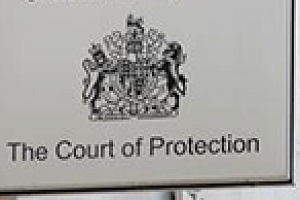
How do you deal with conflicts of belief in schools and colleges?

Public law case update Q1 2025

FOI and communication

The final say

Nine out of 10 "high-risk" toxic sites have not been tested by councils, BBC investigation finds
News Headlines
Supreme Court to hear case on ending of section 193 Housing Act duty
Letter to Guardian from celebrities and others warns government against removing EHCPs
London borough leaves domestic abuse survivor street homeless for five weeks, Ombudsman finds
Court of Appeal allows appeal against BBC in open justice case
Court of Appeal allows liability claim against council over “dangerous” hole in grass verge
New Hillsborough Law will include legal duty of candour, says Prime Minister
Social landlords should monitor hate crime incidents across homes and may need to work with other bodies to resolve ASB: Housing Ombudsman
Flying Pride Flag needs “advertising consent” says planning authority in Warwickshire row
MPs call for new commissioner to help curb council legal disputes over street works
Government opens consultation on reformed Decent Homes Standard to include privately rented housing
Government to review local authority legislation and statutory duties in bid to reduce bureaucracy
Renters Reform Bill to be delayed until Autumn: report
Warwickshire Chief Exec defies Reform council leader's request to remove Pride flag
Judge criticises claim against council in private dispute
Parents to take legal action against council and charity over abuse of disabled children
Council backtracks on planning refusal at planning inquiry over five year housing land supply
“Deep-rooted reform” of asylum and care system for unaccompanied asylum-seeking children needed in capital: London Councils
First Tier Tribunal issues lifetime banning order for four landlords
Court of Appeal refuses permission to bring legal challenge against EHRC over consultation period
High Court overrules planning inspector over decorative shroud on listed building
Building safety regulator faces shake-up in bid to improve performance
Schools adjudicator overturns decision by council to close primary school citing “notable deficiencies” in statutory process
Borough council consults on creating new parish councils ahead of local government reorganisation
Pre-action protocol letter sent over plans for cycleway through nature reserve
Government issues draft guidance for “Awaab’s Law” set to come into force from October 2025
Commuter who suffered serious injuries falling down gap between platform and Tube launches High Court claim against TfL
High Court injunction blocks unauthorised encampments at 12 sites
MHCLG civil servants start industrial action over return to office mandate
Council wrongly withdrew woman’s care package without considering how her needs would be met pending sale of land, Ombudsman finds
Council wrongly decided man deprived himself of assets for purpose of reducing care fees, Ombudsman finds
Half of all councillors have had untrue information about them published, LGA survey finds
Permission granted for Court of Appeal hearing against Portland waste incinerator
Cabinet office launches 10-week Procurement Reform Consultation
Figures showing “record breaking” demand for support spark renewed calls for government to write off SEND deficits
Council told to apologise to private landlord after taking "too long" to apply to Court of Protection for permission to end woman's tenancy after she lost capacity
Six judges promoted to Court of Appeal
Next Parliamentary and Health Service Ombudsman confirmed
University names law firm as single service provider on £2.5m+ contract
TfL to press ahead with pedicab regulation in London following consultation
Ombudsman issues guidance for councils on Disabled Facilities Grants
Judicial review over reorganisation of air ambulance services in Wales fails
London borough avoids contempt finding after completing works in disrepair case
Scope of expedited part 1 written representations process to be expanded to deal with wider range of planning appeals: Ministry
Government should tailor governance and audit requirements for small public bodies, says spending watchdog
EHRC adds “clarification” to interim guidance on practical implications of Supreme Court judgment on definition of sex in Equality Act
News
News
ICO launches AI and biometrics strategy
Eight specialist employment law barristers join 4-5
Birmingham on verge of settling equal pay claims
News
Consultation on Surrey reorganisation kicks off
Government minded to send Commissioners into Croydon
Spending Review 2025: Reaction from the sector
News
Must read
Families refusing access to support
Must read
Families refusing access to support
Must read
Families refusing access to support
Must read
Families refusing access to support
Features

One teacher, two jobs

Is overheard 'banter' harassment?

Employment Rights Bill: key measures and next steps

How do you protect your staff from parental aggression and abuse?

Grievance and disciplinary processes
Features

Local government reorganisation: the impact on procurement and contracts

Recording and publishing officer decisions

Who runs councils in no overall control?

Local inquiries into Child Sexual Exploitation are merely pins on a map; a national inquiry is needed to string them together

A New Kind of Local Government Reform?
Features

The scope and purpose of s166 DPA: a procedural and not a merits route of challenge

AI solutions: the contractual issues

Generative AI and data protection

AI in the UK public sector

Information governance and AI
Features Test

Producing robust capacity assessments and the approaches to assessing capacity

Disability discrimination and proportionality in housing management

Cross-border deprivation of liberty

Dealing with unexplained deaths and inquests

Court of Protection case update: May 2025
Features

Producing robust capacity assessments and the approaches to assessing capacity

Disability discrimination and proportionality in housing management

Cross-border deprivation of liberty

Dealing with unexplained deaths and inquests

Court of Protection case update: May 2025
Features

IPA guidance 2025: Managing PFI distress and preparing for expiry

What might the public inquiry on child sexual exploitation look like

Data (Use and Access) Act – Updating Data Protection Law and more

High Court Dismisses Challenge to New Super Prison

AI, copyright and LLMs

Automatic suspensions and the public interest

FOI and communication
Webinars
Whistleblowing: Detriment and Dismissal Cases
Webinars
Avoiding local government failure – the changes needed by the sector to safeguard against failure
Webinars
Data Protection Essentials
Sponsored articles
What is the role of the National Trading Standards Estate & Letting Agency Team in assisting enforcement authorities?
SPONSORED

Unlocking legal talent

How hair strand testing should be instructed for family court proceedings
Webinars
Property Nuts and Bolts – Part 4 – Boundary disputes - Landmark Chambers
Webinars
Is Omeprazole the new EDS?
More features
Understanding the key staffing issues in Local Government Reorganisation
Employees and social media posts: the Court of Appeal in Higgs v Farmor’s School
TUPE transfers: I object! Yes, but why?
Protected beliefs and the Equality Act 2010
A widening of worker status?
Work-related stress: a key issue for employers
Engaging with all allegations
Comments about accents
Raising new substantive arguments at appeal stage
LGPS fund management reforms
Fire and re-hire: increased protective awards
Whistleblowing: Detriment and Dismissal Cases
Wiping the slate clean - tips and tactics on how best to achieve settlement in the ET
Disability-related absences and dismissal
The Employment Rights Bill 2024 – What’s in, What’s out, and What’s next
USDAW v Tesco: the end of fire and rehire?
Procedural steps not taken by employee irrelevant to constructive dismissal claim
Positive action v positive discrimination: how to avoid crossing the (thin blue) line
What next for employment law?
The strategic importance of maintaining a positive workplace culture
The new law on sexual harassment in the workplace: what is it and why does it matter?
Job fraud on the rise: the new recruitment challenge
Local authority employers - What's in a name?
Workplace investigations demystified
Restructure and redundancy
Equal pay: the material factor defence
Changes to the code of practice on fire and re-hire
Outsourcing the problem: equal pay and local authority trading companies
The top five employment cases that will shape 2024
Expressing lawful views at work
More features
Local authority constitutions and the right of councillors to vote
Thinking ahead
Understanding the Local Authorities (Functions and Responsibilities) (England) Regulations 2000
Approaching the pre-election period
AI in Local Government
Raising the standard - or a missed opportunity?
Navigating the devolution revolution: A guide for local authorities
Disqualification as an elected member
Five challenges facing local government in 2025
Member and officer indemnities
A strengthening of the member conduct regime in England?
The White Paper – new organisations and new rule books to come
Navigating the future: A consultative approach to local government funding reform
‘All hail the Mayor’
Devolution: the opportunities and the challenges
Bold ambitions
Mind the gap(s)
Complying with the Public Sector Equality Duty
Changes in death certification
A new code of conduct for directors
How virtual meetings are shaping local democracy
Addressing the challenges and opportunities in local government reform
The public law duty to consult
Government Legal Risk Matrix updated
Proposed Law Commission reforms to free up grave space
From asylum seeker to monitoring officer
Members' interests, bias and pre-determination
Disclosure of confidential information
The future of devolution under Labour
From the Twin Pillars to the Golden Triangle – a balancing of the powers
More features
Practical tips for DSARs
Data protection prosecutions and employer liability
The public sector and compliance with GDPR
Facial recognition in schools
The King’s Speech: What now for AI regulation and Data Protection reform?
Disclosure of information and immunity from suit
Processing biometric data: key considerations for your organisation
AI Regulation and the EU AI Act
Body worn camera footage
Delo: clarity on ICO complaints
ICO guidance on monitoring workers: what do employers need to know?
FOIA and aggregation of exemptions
The Information Commissioner's discretion to determine complaints
FOI backlogs at the forefront
Another day, another police data breach
Beware misusing personal data
Operating CCTV lawfully
International data transfers
GDPR compensation claims: no threshold of seriousness
Experian’s GDPR appeal: lawfulness, fairness, and transparency
The new DP Reform Bill: what’s changed?
Rogue employees and personal data
GDPR and AI: The Rise of the Machines
ICO reprimand for misuse of children’s data: a proportionate response or a let off?
Subject access requests, delays and claims
Subject access requests and delays
Damages for Data Protection Act breaches
Cybercrime in the public sector — it’s time to pay more attention
Local authority companies and FOIA
The Data Protection and Digital Information Bill: A new UK GDPR?
More features
Provision of same-sex intimate care
Court of Protection case update: April 2025
High Court guidance on Article 3 engagement in care at home cases
‘Stitch’, capacity and complexity
Issuing proceedings in best interests cases
Court of Protection case law update: March 2025
The Health and Social Care (Wales) Bill Series – Regulation and Inspection of Social Care
The Health and Social Care (Wales) Bill Series – Direct Payments for NHS Continuing Healthcare
What is the right approach to Care Act assessments?
Disabled people in immigration bail: the duties of the Home Office and local authorities
Capacity, insight and professional cultures
Court of Protection update: February 2025
Setting care home fees
Could this be the end for local authority-provided residential care?
“On a DoLS”
It’s all about the care plan
Court of Protection case update: January 2025
Mental capacity and expert evidence
Best interests, wishes and feelings
Capacity, sexual relations and public protection – another go-round before the Court of Appeal
Court of Protection Update - December 2024
Fluctuating capacity, the “longitudinal approach” and practical dilemmas
Capacity and civil proceedings
Recovering adult social care charges via insolvency administration orders
Court of Protection case update: October 2024
Communication with protected parties in legal proceedings
The way forward for CQC – something old, something new….
The Ombudsman, DoLS and triaging – asking the impossible?
Outsourcing and the Human Rights Act 1998 – the consequences
Commissioning care and support in Wales: new code of practice
More Features

Too much?

Deploying ‘ADR’ in Planning & Compensation contexts

Removal from the village green register

The attendance of experts in family proceedings

Local authority enforcement powers and domestic beekeeping

Too little? When intervention is not required

Closures of educational sites

Public law case update Q1 2025

The scope and purpose of s166 DPA: a procedural and not a merits route of challenge

Local government reorganisation: the impact on procurement and contracts

Recording and publishing officer decisions

AI solutions: the contractual issues

How do you deal with conflicts of belief in schools and colleges?

Modifying subsidies: What is permitted and what is not?

Getting new PPP right: Smarter tools for smarter infrastructure

Negotiating s106 agreements

Heat network zoning coordination

Mediating PFIs

Generative AI and data protection

Zones/RABs and heat networks: The path to an investible infrastructure asset class?

The final say

The seven questions to address in a welfare analysis

Too late

VAT on school fees and its impact on the SEND system: an emerging pressure point

Expert fees in public law children cases

Producing robust capacity assessments and the approaches to assessing capacity

One teacher, two jobs

The 26-week timeframe and care proceedings with an international element

Too little? Or too late?

Partial debt guarantees- Reviving Investment in UK Water Infrastructure

Unlocking legal talent

Re A compliance in care proceedings

AI in the UK public sector

Planning reform to accelerate housing delivery - at what cost?

Mobile phones and deprivations of liberty
- Details
Is depriving a person of their mobile phone depriving them of their liberty? That was the very 21st century question confronting a High Court judge recently. Whilst his analysis concerned the position of a 16 year old, his conclusions apply equally to adults, writes Alex Ruck Keene KC (Hon).

The interplay between the Housing Act 1996 and the Care Act 2014
- Details
Joshua Swirsky reports on how a local authority successfully defended a judicial review about its withdrawal of funding of temporary accommodation, which had been allowed to continue since 2016.

Court of Protection case review: January 2023
- Details
Eleanor Suthern rounds up the latest Court of Protection judgments of interest to practitioners.

LPS consultation and ‘go live’ planning
- Details
Lynette Wieland and Kelsey Richardson outline the key points of the draft Code of Practice and Regulations for the Liberty Protection Safeguards – and share their top tips for preparing for the go live date.

George Orwell and best interests
- Details
The Deprivation of Liberty Safeguards (DoLS) and public protection are under the spotlight. Alex Ruck Keene KC examines a recent Court of Protection ruling.

Adults with impairments are not big children
- Details
A Court of Protection judge has issued a ringing refutation of a “regressive” assertion, writes Alex Ruck Keene.
Page 18 of 270
22-10-2025 4:00 pm
05-11-2025 4:00 pm































































